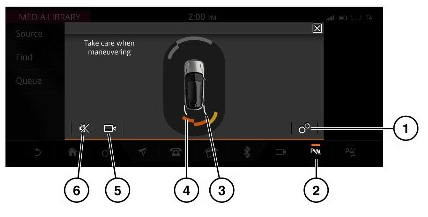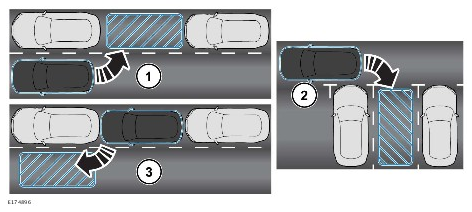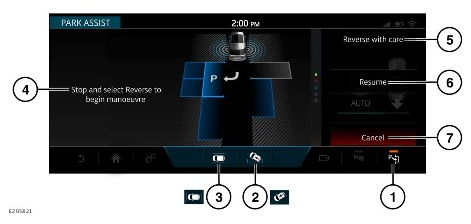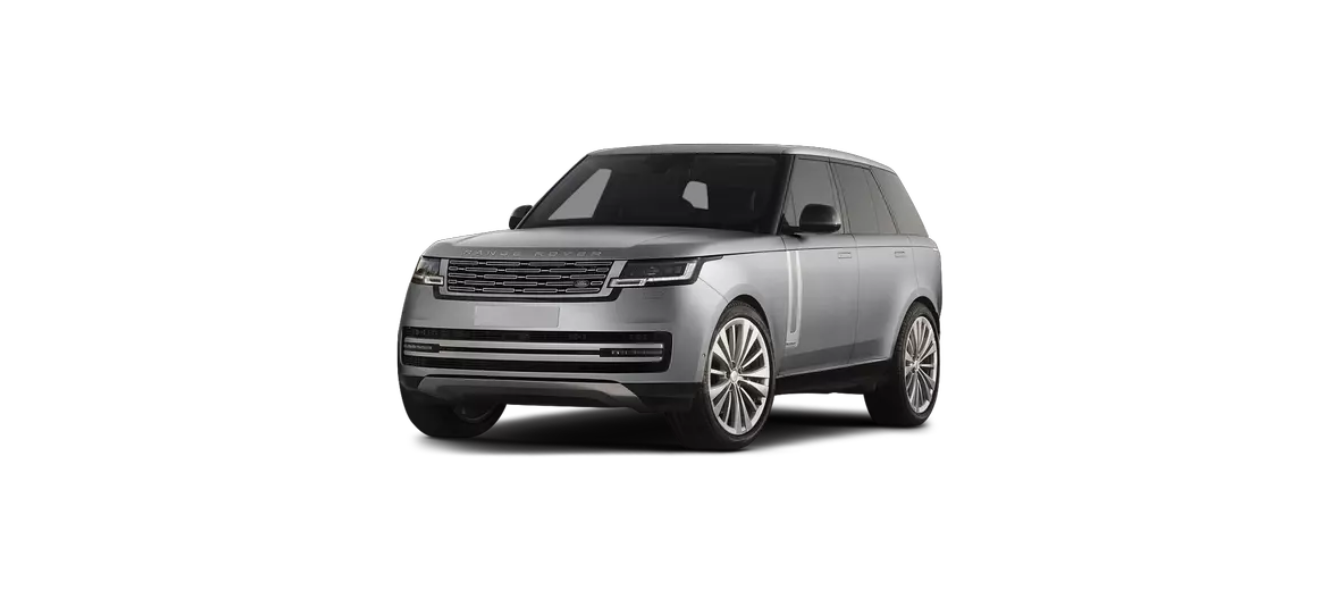2022 Land Rover Range Rover Parking Features

PARKING FEATURES SAFETY
Make sure the following warnings and cautions have been read and fully understood before driving the vehicle.
Failure to use the parking systems safely could result in damage to the vehicle, or an accident, leading to serious injury or death.
The sensors for the parking systems do not detect moving objects, such as children and animals until the objects are dangerously close. The driver is responsible for driving with due care and attention during low-speed maneuvers.
The parking features are driving aids only. The driver is responsible for driving with due care and attention during parking maneuvers.
The driver must maintain full control of the accelerator and brake pedals throughout the parking maneuvers.
All sensors must be kept clean and free from debris or obstructions, e.g., leaves, mud, snow, ice, frost, or insects. Failure to keep the sensors clean may result in sensor miscalculation or false indications.
The parking features must not be used if a sensor is damaged, or the bumper is damaged sufficiently enough to affect a sensor mounting point. Failing to follow these guidelines may result in sensor miscalculation or false indications.
The parking features must not be used if a sensor is obstructed by items attached to the vehicle, e.g., bumper covers, a cycle rack, or stickers. Failing to follow these guidelines may result in sensor miscalculations or false indications.
When using the park assist feature, the parking exit mode operates only when the vehicle has been parallel parked. Parking exit does not maneuver the vehicle from a perpendicular parking space. The driver is responsible and must not use parking exit mode to exit a perpendicular parking space.
When using the park assist feature, do not perform a parking exit maneuver until instructions display on the touchscreen.
Although the vehicle takes control during the parking or exiting maneuver, the driver must maintain full control of the accelerator and brake pedals throughout. When the maneuver is not as expected, take control of the steering and make any necessary adjustments.
Make sure the relevant safety warnings and cautions have been read and understood before operating the touchscreen. See TOUCHSCREEN SAFETY.
The parking features sensors may also be externally influenced by noise generated from air brakes, emergency vehicles, motorcycles, pneumatic drills, and high wind. The driver is responsible for driving with due care and attention during low-speed maneuvers.
The sensors for the parking systems may not detect some obstructions. For example, narrow posts or small objects close to the ground. Objects above the sensor level may not be detected, e.g., when approaching a flatbed truck, the protruding part of the flatbed may not be detected. Additionally, the parking system operation may be limited, when maneuvering the vehicle near wooden objects, e.g., a wooden post.
Do not aim a high-pressure water jet directly at any of the sensors when washing the vehicle. Only use approved vehicle shampoo. Do not use abrasive materials, or hard or sharp objects, to clean the sensors. Failure to follow these guidelines may result in damage to the system or cause a system fault.
Particular care must be taken when using the parking features if accessories are fitted to the front or rear of the vehicle. For example, a cycle rack mounted in a position where it obstructs the operation of the parking sensor(s). If the affected sensor(s) is obstructed, the sensor(s) only indicates the distance from the bumper to the cycle rack. Any obstacle beyond the detected accessory may not be indicated on the touchscreen display.
Park assist must not be used if a temporary spare wheel is in use.
Park assist must not be used if the vehicle is being used to transport a load that extends beyond the vehicle’s perimeter.
When using the park assist feature, do not use the parking exit when leaving a perpendicular parking space. The parking exit is programmed for leaving only parallel parking space. Damage to the vehicle, or surrounding objects, may occur if a parking exit is used when leaving a perpendicular parking space.
USING THE PARKING AID
Make sure the relevant safety warnings and cautions have been read and understood before operating the parking features. See PARKING FEATURES SAFETY.
The sensors must be kept clean to maintain accuracy and performance.
If a trailer is connected to an approved trailer socket, the rear parking sensors are disabled. If the trailer’s electrical plug is not connected to the socket, or a non-approved towing system is fitted, the parking sensors do not operate as intended.
The parking aid pop-up screen is displayed when a possible threat is detected.
The parking aid settings pop-up menu is only accessible when the parking aid feature is enabled, and the parking aid pop-up screen is displayed.

- Settings icon: Touch to select the SETTINGS pop-up menu. Touch the Parking aid settings to access the PARKING AID SETTINGS screen.
- Parking aid icon: Touch to activate the parking aid system.
- Vehicle steering trajectory lines: Projected reversing path, based on the current steering wheel position.
- Parking aid sensor detection zones:
Gray blocks indicate objects detected that do not pose a threat, i.e., not in a collision path with the vehicle.
Colored blocks indicate objects detected that pose collision threats.
- Camera icon: Touch to select the camera’s feature. See REAR CAMERA and SURROUND CAMERA SYSTEM.
- Volume icon: Touch to lower the volume of the warning tones for the current parking aid maneuver. See PARKING AID VOLUME.
The parking aid system assists the driver while maneuvering the vehicle at low speed in confined spaces. The touchscreen displays object tracking along the front, sides, and rear of the vehicle, when active. The front, side, and outer rear sensors monitor a fixed distance around the vehicle. The inner rear sensors monitor a greater distance at the rear of the vehicle. The four side sensors provide 360° parking aid monitoring along the vehicle’s sides, thereby, creating a virtual detection zone.
The parking aid system also detects low objects, e.g., curbs in the front and rear detection zones. The curbs are tracked as the vehicle approaches, even when the curbs are no longer seen by the sensors.
At vehicle start-up, the front sensors may not detect low objects, even if the objects were detected during the original parking maneuver.
While the vehicle is passing an object within its sensor range, the vehicle’s integrated systems calculate its steering trajectory. The touchscreen displays the trajectory lines (3) in the parking aid monitored area. The steering trajectory lines indicate the projected path of the vehicle, based on the current steering wheel position.
To configure the appearance of the trajectory lines:
- Select the settings icon (1) to access the PARKING AID SETTINGS pop-up menu.
- Select Trajectory lines ON or OFF.
The trajectory lines selection is retained after the vehicle’s electrical system is restarted.
If a detected object is calculated to be a collision threat, it is displayed as colored blocks. The distance from a collision threat is color-coded: yellow to amber to red, with red being the closest. Other detected objects that are not a collision threat are displayed as gray blocks.
When the parking aid system is active, the system only provides information of obstacles when a threat is detected.
A warning tone sounds, which increases in speed as the vehicle approaches the object. The tone becomes continuous when the object is within 12 in (300 mm) of the vehicle. The warning tone sounds from the area in which a collision threat has been detected.
While the vehicle is stationary, the sensors for the parking aid system do not detect objects or people approaching from the side. Also, at vehicle start-up, the vehicle has no sensor information about side objects or people. In these situations, ! is displayed on the touchscreen in these virtual detection zones.
To manually enable the parking aid system:
- Touch the parking aid icon (2). The icon illuminates while the parking aid system is enabled.
- Touch icon 2 again to disable the system. The LED extinguishes.
The parking aid system also activates if Reverse (R) or Neutral (N) is selected.
The parking aid system can be set to activate automatically for when:
- The vehicle’s speed falls below 6 mph (10 km/h).
- Drive (D) is selected.
To enable the auto-on feature:
- Select the settings icon (1) to access the PARKING AID SETTINGS pop-up menu.
- Select Automatic PDC ON.
The auto-on feature selection is retained across all ignition cycles.
PARKING AID VOLUME
To adjust the volume of the parking aid warning tones, rotate the media volume control while the tones are active. See MEDIA CONTROLS.
Touch the volume icon, in the parking aid or camera features screen, to reduce the volume for that maneuver only. See USING THE PARKING AID, REAR CAMERA, and SURROUND CAMERA SYSTEM.
PARKING AID LIMITATIONS
The parking aid system is deactivated and cannot be reactivated if:
- The vehicle’s speed is greater than 10 mph (16 km/h).
- Park (P) is selected.
- All Terrain Progress Control (ATPC) is active.
- Wade’s sensing is active.
- There is a system fault.
If a parking aid system fault is detected, the touchscreen or instrument panel displays a warning message. If all of the sensors are clean and the fault is not rectified after an ignition cycle, contact a retailer/authorized repairer.
PARKING AID SYSTEM FAULT
If a parking aid system fault is detected, a long, high-pitched tone sounds, and the parking aid icon flashes. See USING THE PARKING AID.
The touchscreen or instrument panel displays a parking aid warning message. If all of the sensors are clean and, after restarting the engine, the issue persists, contact a retailer/authorized repairer.
PARK ASSIST
Make sure the relevant safety warnings and cautions have been read and understood before operating the parking features. See PARKING FEATURES SAFETY.
To cancel an active park assist maneuver, at any point, hold or turn the steering wheel. Alternatively, touch the park assist icon. See SELECTING PARK ASSIST.
All of the doors and the tailgate must be securely closed when using park assist.
During any park assist maneuver, the parking aid system remains active and emits a warning tone when objects are detected close to the vehicle.
The park assist system is an aid to maneuver the vehicle in and out of a parallel parking space and into a perpendicular parking space only. Park assist takes control of the vehicle’s steering system to maneuver the vehicle.

The park assist system comprises of three modes:
- Parallel parking: For reversing into a parking space that is parallel to the vehicle.
- Perpendicular parking: For reversing into a parking space that is at a 90° angle to the vehicle.
- Parking exit: For exiting only a parallel parking space.
The touchscreen displays all park assist instructions.
SELECTING PARK ASSIST
Make sure the relevant safety warnings and cautions have been read and understood before operating the parking features. See PARKING FEATURES SAFETY.

- Park assist icon: Touch to select the PARK ASSIST screen.
- Parking exit icon: Touch to select a parking exit maneuver. If a parking exit maneuver is selected, the icon changes to a parking icon.
- Parallel/perpendicular parking icon: Touch to select a parallel or perpendicular parking maneuver.
NOTES
The parallel/perpendicular parking icon only displays if the parking space can be offered as a parallel or perpendicular space.
- Park assist maneuver main screen: Provides the driver with park assist instructions.
- Park assist maneuver side panel: Provides the driver with step-by-step park assist instructions.
- Resume soft key: If a park assist maneuver is interrupted by the driver’s steering wheel intervention or overspeeding, the driver can resume the maneuver. Touch Resume to continue with the maneuver.
- Cancel soft key: If parking assistance is no longer required, touch Cancel to exit the selected park assist maneuver.
Touch the park assist icon (1) to activate the park assist system. The icon illuminates while the system is enabled. Touch icon 1 again to disable the system. The LED extinguishes.
When the park assist system is active, the system automatically selects a parking space and the required parking maneuver. Touch icon 3 to change the selected parking space and maneuver.
For example, when a parallel parking space has been automatically selected by the park assist system, the parallel parking maneuver mode is selected. Touch icon 3 and select the perpendicular parking maneuver mode to change from a parallel parking maneuver.
Only when the vehicle is parallel parked, the driver can use the parking exit feature for the vehicle to exit the parking space. Touch the parking exit icon (2) for the parking exit maneuver to proceed.
During a parking exit maneuver, the parallel/perpendicular parking icon (3) is not available.
The park assist system can be canceled, at any time, by touching the park assist icon (1) or the Cancel soft key (7).
USING PARK ASSIST
Make sure the relevant safety warnings and cautions have been read and understood before operating the parking features. See PARKING FEATURES SAFETY.
For park assist to search effectively for a space, the park assist system must maintain a distance of 1.6 ft to 4.9 ft (0.5 m to 1.5 m). The distance of 1.6 ft to 4.9 ft (0.5 m to 1.5 m) is between the vehicle and the row of parked vehicles or obstacles.
As the vehicle is driven forward, the size of a potential parking space is assessed.
The park assists auto-searching feature becomes active when the vehicle’s speed is less than 18 mph (30 km/h).
When park assist auto-searching is active, the instrument panel menu displays a park assist auto-search icon¹.
When park assist is selected and parallel parking/perpendicular parking is active, a space may already have been detected by the auto-searching feature. The park assist main screen (4) displays the detected parking spaces in blue. An instruction message is also displayed. See SELECTING PARK ASSIST.
When a pre-selected parking space is found, a short confirmation tone is given.
The park assists the main screen displays any detected parking spaces that are too small or non-maneuverable grey.
If more than one valid space is displayed in the park assist the main screen, and touch the preferred parking space to change from the pre-selected parking space.
The park assist system may determine that other vehicles are too close, on either side, to perform a parking maneuver. A detected space can be rejected, even if it is large enough for the vehicle. The driver retains the option to switch park assist off and attempt the maneuver manually.

Park assist auto-search icon.¹
The purpose of the park assist auto-search icon¹ is to provide information to the driver that valid parking spaces are being searched for. In order to use park assist, the feature must still be activated via the touchscreen. See SELECTING PARK ASSIST.
The park assists auto-search icon¹ only displays in the instrument panel when the vehicle is driven under 18 mph (30 km/h) and the park assist system is searching for spaces.
The following images display the different states of the icon in the instrument panel:
No valid parking slots.
Valid parking space on the right.
Valid parking space on the left.
Valid parking spaces on both sides.
Select the parking exit icon. See SELECTING PARK ASSIST.
When the vehicle is parallel parked, the park assist system automatically determines the most appropriate side for a parking exit maneuver. Using the turn signals, the driver can override the pre-selected side for a parking exit maneuver. The operated turn signals notify the park assist system of which side the driver intends to leave the parking space.
For the parking exit mode to operate correctly, the vehicle must be parked in a space where other vehicles or objects are either:
- Parked in front of the vehicle.
- Parked in front and behind the vehicle.
Sufficient space is required in front and behind the vehicle for the parking exit mode to operate correctly.
During any park assist maneuver, the parking aid system remains active.
For all park assist modes, follow the instructions on the main screen (4) or side panel (5), until the maneuver is complete. See SELECTING PARK ASSIST.
A park assist maneuver cancels if:
- The park assists icon is touched. See SELECTING PARK ASSIST.
- The Cancel soft key (7) is selected. See SELECTING PARK ASSIST.
- The parking aid system’s warning tone sounds for longer than 10 seconds.
- The Anti-lock Braking System (ABS) is operated.
- A parallel parking maneuver has exceeded the maximum of 9 shuffles.
- A perpendicular parking maneuver has exceeded the maximum of 7 shuffles.
- The park assist instructions are not followed.
- Park (P) is selected for more than 10 minutes.
- The vehicle’s speed exceeds 4 mph (7 km/h).
- Wade sensing is enabled.
If a system fault is detected, a continuous tone sounds, and the touchscreen or instrument panel displays a warning message. If all of the sensors are clean and the fault is not rectified after an ignition cycle, contact a retailer/authorized repairer.
PARK ASSIST LIMITATIONS
Make sure the relevant safety warnings and cautions have been read and understood before operating the parking features. See PARKING FEATURES SAFETY.
If an approved tow bar is fitted, park assist adjusts to compensate for the extra length.
The park assist system is not available if:
- The vehicle’s speed is greater than 18 mph (30 km/h).
- All Terrain Progress Control (ATPC) is active.
- Reverse (R) is selected.
- The suspension height is set to off-road.
- Wade’s sensing is active.
- There is a system fault.
- A trailer is connected.
The park assist system may provide inaccurate results if:
- The size or shape of the parking space changes after it was measured.
- There is an irregular curb alongside the parking space, or the curb is covered with leaves, snow, etc.
- The vehicle is being used to transport a load that extends beyond the perimeter of the vehicle.
- The sensors are misaligned due to a minor collision or impact.
- The vehicle had a repair or alteration that was not approved by a retailer/authorized repairer.
- The vehicle is fitted with non-approved wheels or tires.
- The vehicle’s tire pressures are not set to the vehicle’s recommended specification.
- The vehicle’s tires have significant tire wear.
- The vehicle is fitted with replacement tires. After the normal running-in period, the system adapts to the replacement tires.
- One of the parked vehicles has an attachment at a raised height such as a flatbed truck, snow plow, or hoist.
- The parking space is located on a corner or bend.
- The sensors are dirty or covered in mud, ice, snow, etc.
- The weather is foggy, raining, snowing, etc.
- The road surface is uneven or rutted.
- The vehicle encounters an obstruction that is thin or wedge-shaped.
- The vehicle encounters an obstruction that is elevated and/or protruding, such as ledges or tree branches.
- The vehicle encounters an obstruction with corners and sharp edges.
- A non-approved tow bar or trailer hitch is fitted.
- The sensors are in close proximity to hot exhaust gases from nearby vehicles.
- The sensors are in close proximity to noise generated from emergency vehicles, motorcycles, etc.
- The sensors have been damaged during vehicle cleaning.
PARK ASSIST TROUBLESHOOTING
Make sure the relevant safety warnings and cautions have been read and understood before operating the parking features. See PARKING FEATURES SAFETY.
The following may be a reason why the park assist system is not searching for a parking space:
- The system may not be activated.
- The vehicle may be traveling above 18 mph (30 km/h).
- The sensors may be covered or partly obscured by dirt, mud, ice, snow, etc.
- The approach angle may not be suitable.
The following may be a reason why the park assist system does not offer a certain parking space:
- The sensors may be covered or partly obscured by dirt, mud, ice, snow, etc.
- The space may not be large enough to accommodate the vehicle.
- There may not be enough space on the opposite side of the vehicle for the front to swing out during the maneuver.
- The vehicle may have been driven more than 5 ft (1.5 m) from the row of parked vehicles.
- The vehicle may have been driven within 16 in (41 cm) to the row of parked vehicles.
- The vehicle may have been driven in Reverse (R). Park assist searches for a parking space only when the vehicle is in Drive (D).
- The approach angle may not be suitable.
The following may be a reason why park assist has not positioned the vehicle accurately within the space:
- One or more of the system limitations criteria may have been met. See PARK ASSIST LIMITATIONS.

